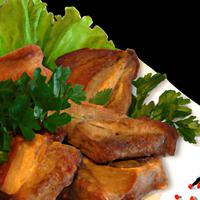
1 serving (100 grams) contains 242 calories, 21.0 grams of protein, 17.0 grams of fat, and 0.0 grams of carbohydrates.

Log this food in SnapCalorie

Nutrition Information
Calories |
576.2 | ||
|---|---|---|---|
% Daily Value* |
|||
| Total Fat | 40.5 g | 51% | |
| Saturated Fat | 14.8 g | 74% | |
| Polyunsaturated Fat | 0 g | ||
| Cholesterol | 166.7 mg | 55% | |
| Sodium | 135.7 mg | 5% | |
| Total Carbohydrates | 0 g | 0% | |
| Dietary Fiber | 0 g | 0% | |
| Sugars | 0 g | ||
| protein | 50 g | 100% | |
| Vitamin D | 0 mcg | 0% | |
| Calcium | 26.2 mg | 2% | |
| Iron | 2.9 mg | 16% | |
| Potassium | 642.9 mg | 13% | |
* Percent Daily Values are based on a 2,000 calorie diet. Your daily values may be higher or lower depending on your calorie needs.
Food Attributes
Source of Calories
About Fry pork
Fry pork is a savory dish featuring slices or chunks of pork, usually seasoned with spices, marinades, or simple salt and pepper, then pan-fried or deep-fried to develop a crispy exterior and juicy interior. Originating from various global cuisines, it is particularly popular in Southern American, Filipino, and Chinese cooking, often paired with rice, vegetables, or dipping sauces. It is rich in protein and essential vitamins like B12 and zinc, which contribute to muscle health and immune support. However, fry pork can be high in saturated fats and calories, especially when prepared using deep-frying methods, making moderation key for a balanced diet. Opting for lean cuts and healthier cooking oils can improve its nutritional profile. This dish is beloved for its hearty taste and versatility in a wide array of meals, standing out as a flavorful indulgence in both casual and festive dining.



